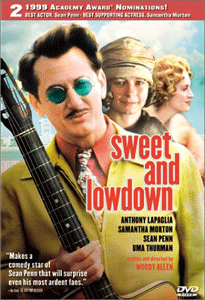“Sweet and Lowdown” (1999) illustrates the magical nature of filmmaking by lacking magic. We knew by this point that writer-director Woody Allen could make great movies – including in this genre, the mockumentary/historical piece (see “Zelig”) – and make them seem effortless. But this one is missing too many ingredients.
Talent without a cause
The screenplay is underdeveloped, leading to a flat finished film. It’s listed as a comedy on IMDb, but Allen doesn’t aim for laughs – except in one pratfall sequence where 1930s guitarist Emmet Ray (Sean Penn) tries to lower onto the stage via a contraption shaped like a quarter-moon.
Allen has a concept, and almost achieves a tone that “O Brother, Where Art Thou?” would tap into a year later. But what’s the reason for this structure if not to set up absurdist comedy? The fictional Ray is – other than Django Reinhardt – the best guitarist in the world. This is self-proclaimed by the egotist, but he backs it up. Ray’s tendency to show up late or miss shows is what trips him up, not a lack of talent or shortage of aficionados.

“Sweet and Lowdown” (1999)
Director: Woody Allen
Writer: Woody Allen
Stars: Sean Penn, Samantha Morton, Uma Thurman
Penn tries to carry the film, but he gets help from Samantha Morton (“Minority Report”) as a sweet (and mentally challenged, perhaps, although it’s never clear) mute gal. Hattie falls for Ray because of his pretty songs; it’s not a good relationship foundation. The Oscars were impressed by both, doling out acting nominations. Both are solid, but in a year with so many great films, it’s odd that the Oscars picked them out of the pack.
Penn makes the pencil-mustached Ray both ridiculous and likable, but doesn’t go far enough in either direction. Morton previews later fashion choices by “Buffy” actress Felicia Day. Hattie is cute with her stocking cap and short curly hair – maybe not Ray’s usual thing, but nice. The actors can’t overcome the fact that there’s little to work with.
“Sweet and Lowdown” never develops weightiness, certainly not as a comedy, and barely as a tragedy. At one point, Ray notes that he’s been with Hattie for eight years, but since Ray doesn’t change and Hattie doesn’t talk, it doesn’t play like eight years have passed. I would’ve guessed eight days.
Almost profound
Allen almost gets at something profound in the closing scene, when Ray finally says something truthful – and it’s tragic because he has lost his audience. Slightly before that, Allen makes a neat choice to keep the camera on Ray when he’s reacting to bad news; something finally goes against his wishes. As a portrait of someone who can’t get out of his own way and who swallows his own swill, “Sweet and Lowdown” is straightforward. I can see Ray’s arc (or tragic lack thereof) clicking for some viewers.

There’s little arguing with the technical side. The production design captures the Thirties in look. It has a depressive sepia tone as Ray talks to Hattie on the underpopulated New Jersey boardwalk. Yet it doesn’t lament the end of the Roaring Twenties (as seen in “Bullets Over Broadway”) nor does it wallow in the Depression.
Dick Hyman’s music, with guitar solos by Howard Alden (and Penn in close-ups), leave little room for complaint. But because the old-time music (often by Hyman) is great in pretty much every Allen film, “Sweet and Lowdown” doesn’t stand out from the pack despite being about music.
If anything, the film’s focus on music ironically emphasizes how little there is to the story, and how thinly the characters are sketched. It’s like Allen was driven to make a comedy – the structure is in place for laughs to be added – but he was feeling low down when he pulled his chair up to the keyboard. This isn’t a comedy, and it’s not a tragedy till the end; mostly, it coasts along in no-man’s land.
“Sweet and Lowdown” is a flavorless middling entry from an auteur who has done much better.

